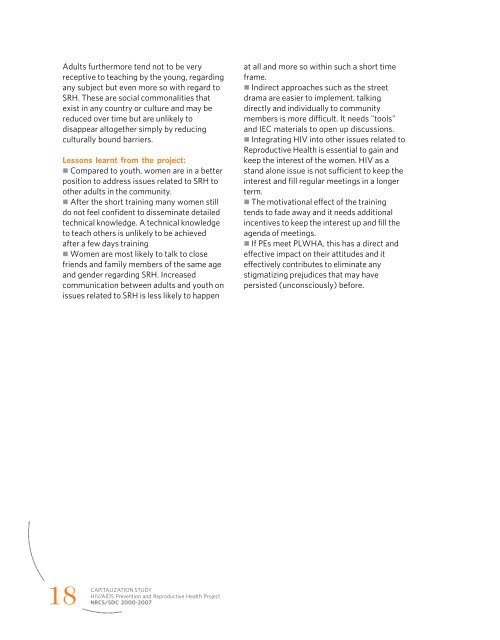HIV/AIDS Prevention & Reproductive Health Project
HIV/AIDS Prevention & Reproductive Health Project
HIV/AIDS Prevention & Reproductive Health Project
You also want an ePaper? Increase the reach of your titles
YUMPU automatically turns print PDFs into web optimized ePapers that Google loves.
Adults furthermore tend not to be very<br />
receptive to teaching by the young, regarding<br />
any subject but even more so with regard to<br />
SRH. These are social commonalities that<br />
exist in any country or culture and may be<br />
reduced over time but are unlikely to<br />
disappear altogether simply by reducing<br />
culturally bound barriers.<br />
Lessons learnt from the project:<br />
• Compared to youth, women are in a better<br />
position to address issues related to SRH to<br />
other adults in the community.<br />
• After the short training many women still<br />
do not feel confident to disseminate detailed<br />
technical knowledge. A technical knowledge<br />
to teach others is unlikely to be achieved<br />
after a few days training<br />
• Women are most likely to talk to close<br />
friends and family members of the same age<br />
and gender regarding SRH. Increased<br />
communication between adults and youth on<br />
issues related to SRH is less likely to happen<br />
at all and more so within such a short time<br />
frame.<br />
• Indirect approaches such as the street<br />
drama are easier to implement, talking<br />
directly and individually to community<br />
members is more difficult. It needs "tools"<br />
and IEC materials to open up discussions.<br />
• Integrating <strong>HIV</strong> into other issues related to<br />
<strong>Reproductive</strong> <strong>Health</strong> is essential to gain and<br />
keep the interest of the women. <strong>HIV</strong> as a<br />
stand alone issue is not sufficient to keep the<br />
interest and fill regular meetings in a longer<br />
term.<br />
• The motivational effect of the training<br />
tends to fade away and it needs additional<br />
incentives to keep the interest up and fill the<br />
agenda of meetings.<br />
• If PEs meet PLWHA, this has a direct and<br />
effective impact on their attitudes and it<br />
effectively contributes to eliminate any<br />
stigmatizing prejudices that may have<br />
persisted (unconsciously) before.<br />
18<br />
CAPITALIZATION STUDY<br />
<strong>HIV</strong>/<strong>AIDS</strong> <strong>Prevention</strong> and <strong>Reproductive</strong> <strong>Health</strong> <strong>Project</strong><br />
NRCS/SDC 2000-2007

















